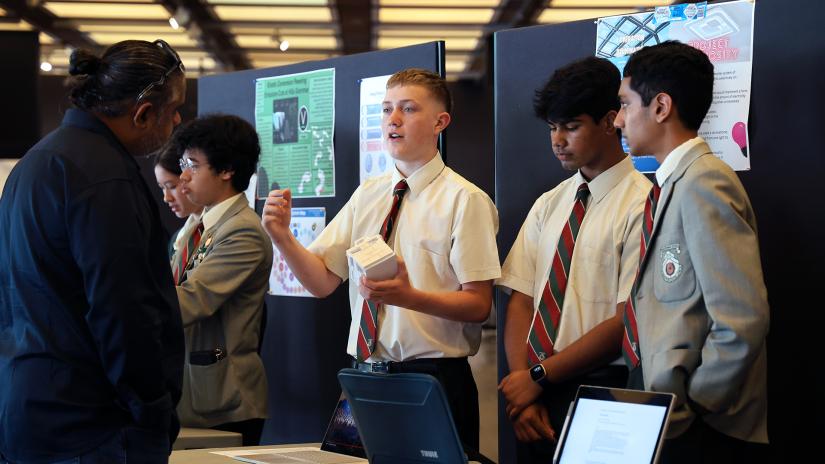UTS’s first Innovation in Complex Systems microcredential for high school students is equipping the next generation to be impactful changemakers.
An innovative collaboration between TD School and Hills Grammar has secondary students leading interventions on reaching net-zero carbon emissions for their school.
An ever-growing pressure to slow climate change means it is now critical to involve the next generation in mitigation efforts and empower them as change-makers in the process.
The younger generations are facing the impacts of a warming planet; it’s only fair they are given a seat at the table for discussions of sustainability, net-zero and innovation.
In doing so, conversations can be enriched with a renewed passion and fresh perspectives while, importantly, cultivating a sense of curiosity and facilitating a greater understanding of innovation within this generation.
In recognition of this need, a pilot program between TD School and Hills Grammar has delivered the UTS Innovation in Complex Systems microcredential to the inaugural secondary school cohort of fifty Year 10 students.

Hills Grammar Year 10 students presenting their work at the showcase (photo: Hills Grammar)
Developing proposals in response to the key challenges and innovation opportunities for Hills Grammar to become net-zero, students examined transdisciplinary thinking, Indigenous perspectives on sustainability and design prototyping.
It definitely challenged my thinking, especially when we had to develop ideas for ways that we could make the school more sustainable. We all initially came up with surface-level ideas, but then we had to think more creatively, more innovatively and in deeper ways.
– Year 10 student Tanya
During their time studying on-campus at UTS, students also participated in tours of the facilities, introducing them to the university’s award-winning sustainability initiatives, such as the UTS Plastic Free Food Court, and game-changing algae bioreactor, Green Genie. Through this exposure to novel innovations, students gained a rich source of inspiration for their interventions.
The microcredential was also an opportunity to challenge students’ pre-existing beliefs about innovation, “I kind of assumed that people woke up in the middle of the night and thought of an amazing idea. But obviously, there’s a lot more of a process and a journey to it than I had originally thought,” shared student Florentine Gates.
The three student teams below were identified as high achievers for their novel insights and interventions.
Motion-censored lights and kinetic energy tiles
Student team: Megan, Azaya, Keira
“We were told to observe, not just to focus on research. They told us to take our time to walk around the school and see any issues we could find, and whether we could dive deep into these, and one of the main things we observed was lights,” said Megan.
“For our first proposal, we were told to do something that was ‘inside the box’, that could be implemented if proposed to the school,” explained Megan. “We had the idea of motion-censored lights in and outside of classrooms … in our observations, we saw that 66% of lights were left on in classrooms even though they weren’t being used - so we thought this would save a lot of energy.”
Azaya explained, “For our second proposal, we suggested implementing Pavegen tiles (developed by a UK-based company). If you walk on the tile it generates about four watts of energy per step. We did all the calculations of how many school days there were in a year, and how many people are on campus, and from this we found out that we can generate two times the amount of power the school already has.”
Combining their inside and outside-the-box ideas, the students suggested the kinetic energy created from the tiles could be used to power the motion-censored lights, with the remaining energy sold back to the grid to generate revenue for the school.
Algae solar panel
Student team: Charlie, Viswajiit, Vincent
Inspired by algae initiatives occurring at UTS during a campus tour, this student team decided to develop a two-layered algae and solar panel. “When the sun hits the algae panel, the algae concentrates the sun’s energy and passes it down to the solar panel,” said Charlie.
In addition to increasing the efficiency of solar panels, Viswajiit added that “due to photosynthesis, the algae actually absorb carbon dioxide to grow, so [the panels] could reduce about 2 tonnes of carbon emissions per day.”
“We also made the algae panel detachable because it can be hard to clean, so being replaceable it’s easier to exchange,” said Charlie.
Any algae that requires replacement would then be repurposed into fertiliser for use across the Hills Grammar campus.
Skylights with shutters
Student team: Tanya, Florentine, Anneliese
“We first came up with the idea of installing skylights, but we thought that was too basic. When we started to think of problems with skylights, we found that they would heat the classroom and then require the air conditioner, which defeats the whole purpose of the skylight using no energy,” explained Tanya.
“As a result, we decided to add shutters onto the skylights which could control the amount of light that comes into the classrooms, so on sunny days you can close the shutters a bit more, which means you won’t have to use as much air conditioning.”
Student teams have been invited to share their proposals with the Hills Grammar school council and executive at their strategic planning day. The school will use these discussions to evaluate the potential to fund and implement the students’ projects.
We would like to thank Hills Grammar for co-designing this net-zero challenge space for students to explore, and for joining TD School as the inaugural partner of the Innovation in Complex Systems microcredential for secondary students.
To enquire about this microcredential for your school, get in touch with td.learning@uts.edu.au.
Find out more about TD School’s microcredential offering.

